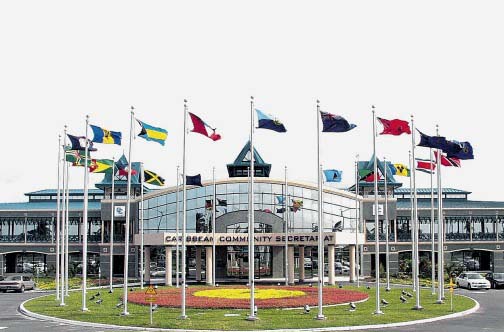If the Georgetown-based Caribbean Community Secretariat has not been exactly ‘hogging the headlines’ insofar as its role in the regional response to the COVID-19 pandemic is concerned, it appears that the Secretariat is very much in the ‘thick of things’ in terms of coordinating the work of the Caribbean Community (CARICOM) insofar as the ongoing engagements pertaining to the recovery of the region from the impact of the virus on its respective economies are concerned.
Last week news surfaced from the 13th Special Emergency Meeting of the Conference of Heads of Government, which was held virtually, in the form of an update on what is being termed the Caribbean Economic Recovery and Transformation Plan (CERT), a strategy put forward by a regional team of experts under the leadership of the Prime Minister of Barbados, Mia Mottley, who is among the most seasoned politicians in the region. Last week’s statement on the work associated with the effective execution of the plan issued by the Secretariat said that work had commenced towards the hoped-for effective execution of the plan and that the region looked forward to its successful completion.
The meeting, the statement said, was being chaired by current Chairman of the CARICOM conference, and serving Prime Minister of Trinidad & Tobago, Dr Keith Rowley, while it also reported on a statement issued in the course of the deliberations expressing their support for Guyana in the country’s border controversy with neighbouring Venezuela.
Meanwhile, against the backdrop of region-wide evidence that there has been no meaningful relenting in the spread of the pandemic and that the region may even now be threatened by a serious mutation of the virus, the regional forum also issued a statement calling for a global summit to address equitable access and distribution of the vaccines to combat the pandemic.
The meeting, meanwhile, went on record as denouncing the unilateral declaration by Washington of Cuba as a “state sponsor of terrorism,” which came just days prior to the end of President Donald Trump’s tumultuous term as President of the United States.
Putting the regional economic ‘jigsaw’ puzzle back together again is almost certain to prove challenging to the Community given, first, its lack of material resources with which to respond to some of the challenges, and secondly, the varying degrees of crisis facing member states. Setting aside the ongoing efforts of the respective mostly small and economically weak member states to stave off the physical effects of the pandemic, not least the pressure being placed on their physical resources, there is also, in the instances of most of the member states, the deep gouges that have been left in their economies by the ‘freight train’ collision impact which the global scaling down of air travel has had on their respective tourism-driven economies and which now appears to be worsening in the face of new travel and quarantine rules that will impact travel between heavily tourism-dependent Caribbean territories from Canada, Europe, and the United States.





